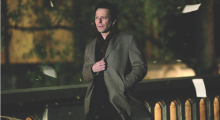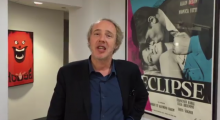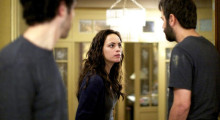Arnaud Desplechin
-
Cannes 2022: Brother and Sister, Pamfir, R.M.N.

Arnaud Desplechin’s Brother and Sister ended to the audible reception of somewhere around seven boos, two derisive whistles and nothing else; if you’re someone who believes indifference is a worse reaction than active hostility, this somehow seemed to split the worst possible difference. Consensus holds, not inaccurately, that Desplechin’s peak work is, at least for now, behind him, with the arguable exception of My Golden Days—non-coincidentally, a prequel to 1996’s My Sex Life. His experiments outside of erratic interpersonal dramas, like 2011’s self-explanatorily titled Jimmy P.: Psychotherapy of a Plains Indian and 2019’s crime drama Oh Mercy!, have been received with tepid bewilderment. I have more sympathy for these […]
by Vadim Rizov on May 22, 2022 -
NYFF 2019: Oh Mercy!, Synonyms

Arnaud Desplechin’s returned to his hometown onscreen many times: “I still have to go back in my tracks, as a malediction—not as a dream, but as a curse,” he’s said of Roubaix, where My Sex Life and My Golden Years‘ protagonist stand-in Paul Dédalus hails from and where A Christmas Tale unfolds. Desplechin’s also shot digitally before, but this is the first time he’s ever aggressively leaned into it: like Tale, Oh Mercy! also starts during the holiday season, but—opening strings of Christmas lights over city streets aside—the dominant colors aren’t red and green but the familiar digital color-correction staples of orange and blue. […]
by Vadim Rizov on Oct 3, 2019 -
Cannes Dispatch #1: Ismael’s Ghosts, Loveless, Wonderstruck

It’s fitting that the Cannes film festival, presently celebrating its 70th incarnation, would choose to open this edition of shameless and unbridled self-reflexivity with a film that does the same. Arnaud Desplechin’s latest, Ismael’s Ghosts, is pure, saturated Desplechin (at least when he isn’t tipping his cap to Hitchcock’s Marnie and Vertigo), perhaps to a fault. Detailing a years-spanning love triangle set to its maker’s characteristic whip-pan rhythm, this is a vision so consciously expressive and overloaded with formal decoration (time jumps, iris-ins, rear-projection montage, direct address to camera and so on) that it finds itself explicitly likening its manically layered […]
by Blake Williams on May 18, 2017 -
Mathieu Amalric on My Golden Days

I spoke with Arnaud while he was here for the festival. One of the things he talked about is that he’ll model things for you, that he’ll show you where to touch your nose or how to grab a glass. He’s very specific when he’s blocking. It’s very good. He said that that’s something that you’re not supposed to do when directing actors. Were you the one who asked him to do that for you, initially? Oh, he does that for himself, to find all the characters. He plays all the characters, especially women, extraordinarily well. It’s impressive. He’s such […]
by Vadim Rizov on Jan 20, 2016 -
The Pre-Fight: Arnaud Desplechin on My Golden Days

Arnaud Desplechin invigorates through assault tactics: aggressive camera movement, even more aggressively fragmented editing, seemingly irreconcilable musical cues that butt chromatic classical cues up against golden age hip-hop, a university library’s worth of citations and allusions. His films are scarcely less restless than their characters, who chafe against themselves and others. In his 1996 breakthrough My Sex Life…or How I Got Into an Argument, Desplechin promoted Mathieu Amalric from supporting bit player (in 1992’s La Sentinelle) to his regular onscreen alter-ego. A philosophy graduate student adept at tormenting both himself and girlfriend Esther (Emmanuelle Devos) while putting off completing his […]
by Vadim Rizov on Jan 20, 2016 -
Watch: Arnaud Desplechin on Notting Hill’s Perfect Metaphor for Cinema

Director Arnaud Desplechin (A Christmas Tale, the excellent forthcoming My Golden Years) is a voraciously catholic viewer in his tastes; see, for example, this recent interview where he talks up the virtues of Superbad and Dazed and Confused relative to French coming-of-age films. So it’s not necessarily surprising that he’s a Notting Hill fan, but his explanation of how one scene uses Julia Roberts’ hidden nudity as a metaphor for cinema itself (!) will definitely throw you for an interpretive loop.
by Vadim Rizov on Oct 20, 2015 -
Festen: The New York Film Festival 2015

For the first time in recent memory, it’s extremely difficult to select the top of the crop at this 53rd edition of the New York Film Festival (September 26-October 11), a question of too many contenders. I am not taking into consideration the tentpole films that anchor the festival, or any big studio movies, like Spielberg’s Bridge of Spies. That’s another kettle of fish. Down below I list what I consider the crème de la crème (appropriate phrase, considering the usual Gallic slant) and review those titles briefly. Since they will all have commercial runs, I’ll be reviewing at length […]
by Howard Feinstein on Sep 25, 2015 -
Cannes 2013: Farhadi’s The Past and Desplechin’s Jimmy P: Psychotherapy of a Plains Indian

Given that James Franco’s adaptation of William Faulkner’s As I Lay Dying will be playing at this year’s Cannes, it seems appropriate to recall one of the novelist’s most famous quotations when thinking about two of the festival’s more memorable films. Reflecting on the conflicts over race and national identity that tore apart the deep south where he lived, Faulkner wrote in Requiem for a Nun, “the past isn’t dead, it isn’t even past.” This persistence of the past — how it can haunt us in myriad ways — is central to two of the more powerful films at this […]
by Chuck Tryon on May 20, 2013 -
Post Mortem — A Hammer to Nail Review
(Post Mortem world premiered at the 2010 Venice Film Festival. It’s being distributed by Kino Lorber Incorporated and opens at the Film Forum in NYC on Wednesday, April 11, 2012. Visit the film’s page at the Kino Lorber website to learn more.) There is such a thing as pitch black comedy, and then there is the work of Chilean director Pablo Larraín, whose warped sense of humor deserves its own adjective. Tar black, maybe? With his latest two films, Larraín has returned to his country’s unpleasant recent past to try to make sense of what transpired. In Tony Manero, the Pinochet […]
by Michael Tully on Apr 12, 2012
